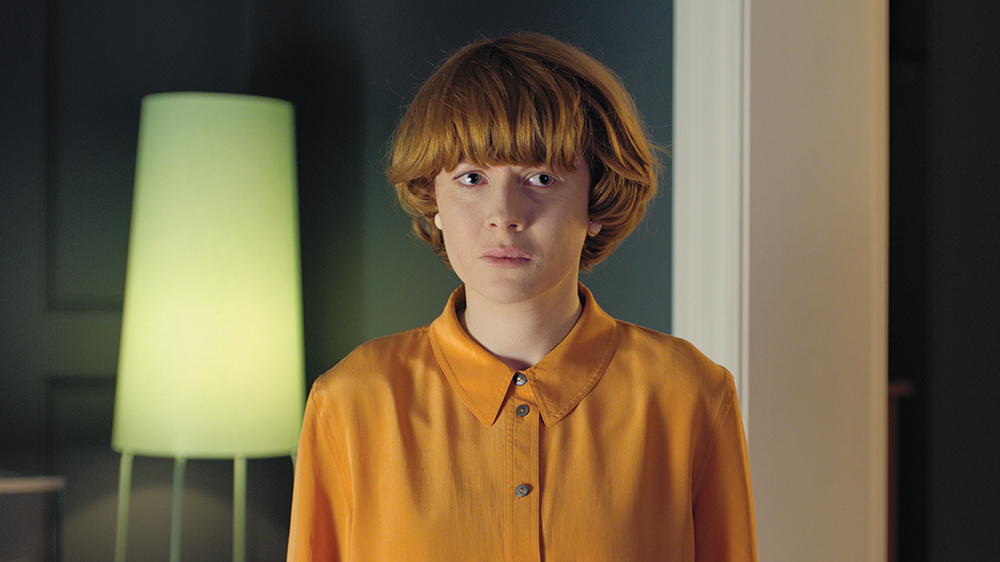Helmed by Austrian filmmaker Jessica Hausner, who is one of the only four women directors in this year’s Official Competition at Cannes, Little Joe is a sci-fi chiller set in England centering on a group of scientists led by Alice (Emily Beecham) inventing a new plant with a very peculiar quirk; the power to alter the mood of those who smell it, invoking an increased state of happiness. This groundbreaking invention — “Little Joe”— proves to have daunting effects for Alice as it starts altering the behavior of the people around her who come in contact with the plant, from her co-workers to her son Joe (Kit Connor). Faced with everyone in a new state of permanent, drugged-out bliss, Alice begins to not only reconsider the positive effects of her own creation but also feels the creeping terror of having her entire world change in front of her eyes — with those closest to her becoming increasingly unrecognizable and dehumanized.
Beecham’s committed performance as Alice is undoubtedly the element of the film that delivers in the most satisfyingly consistent manner. Presented with the Best Actress award at Cannes — upsetting strong competition — it’s notable how she employs Alice’s increased feelings of self-doubt, powerlessness, and desperation, as a scientist and a mother, in her facial expressions. She’s the only true heart of the film, expressing its core human conflict with restraint and remarkable subtlety — things that are nowhere to be found in any other aspect of Little Joe.

In fact, if there’s anything else to be admired about this film, it’s how boldly it leans into and commits to every bizarre, overbearing and off-putting directing choice from start to finish. Hausner seems intent on implementing an awkward monotone, deadpan rigor in every performance that’s not Beecham’s, serving as inhumane counterparts to Alice’s unaltered humanity. Ben Whishaw playing Chris, Alice’s flirty coworker, and Kit Connor as Alice’s pre-teen son are still able to add touches of chilled ambiguity to their performances as victims of Little Joe’s effects, but it doesn’t work for the rest of the cast, who come off cartoonishly stern and even unintentionally hilarious while delivering their lines.
If the actors come off as jarring at points, the same can be said for the use of color and camera movements. Both elements are used to increase unsettlement and create a stone-cold, rigid atmosphere, but the sterile whites and greys in the lab scenes and garish flashes of neon colors prove to be bland, as the unwarranted zooms and constant slow-panning are a distraction from any attempt at dramatic weight. For all this, Little Joe also fails at creating a vivid sense of danger, and allure surrounding the plants. These plants are treated as mere props rather than the center of the horror in the film. Perhaps overcompensating for this lack of terror in its core device, the film ‘s noisy, clunky score blasts at extremely unnecessary instances, hammering the audience to make them feel alert. It’s a genuinely compelling piece of experimental music but it’s grossly misplaced in Little Joe.

With all this, what is Little Joe actually trying to convey? It’s safe to say it speaks on how we are more and more drawn to artificial solutions to cope with general unhappiness and mental illnesses, and how big pharmaceutical companies may be too quick to take advantage of that for profit, discarding one’s own humanity in the process. Unfortunately, like its scant remarks on the nature of motherhood at some point in Alice’s arc, the film merely dabbles in these ideas, being too invested in its own stylistic choices to provide a fulfilling sci-fi allegory. A strong lead performance isn’t enough to make Little Joe an intriguing experience more than it is a puzzling one.
To help us continue to create content, please consider supporting us on Ko-Fi.

